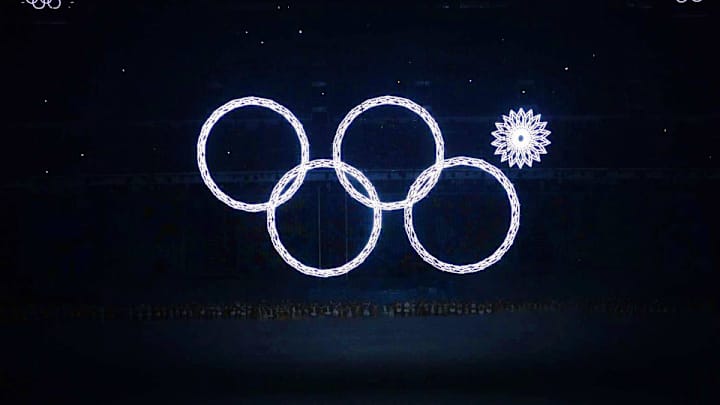Separating what's real from what's not after opening ceremony spectacle

SOCHI -- Russia put Russia on display in a spectacular Opening Ceremony of these Olympics, and Russia was quite impressed. Russia also invites you to be impressed. No, really. Russia insists. We said: REALLY. RUSSIA INSISTS.
The official theme was “Dreams of Russia,” and Russian president Vladimir Putin does not dream of reading a romance novel by the Black Sea. Some host countries use their Opening Ceremonies to seem more organized or welcoming than they really are. Russia had a different dream. From the thunderous introduction of the Russian delegation to the soldiers marching to the constant drumbeats, the ceremony paid tribute to Russia’s power.
“I declare the Olympic Games open,” Putin said, about an hour after I wanted to hide under my desk like a child in a 1950’s nuclear-war drill.
Hammer, meet sickle. It’s been a while. There was a nod to War and Peace and another to Peter the Great. The ceremony was a bit intimidating, but it was still just a show, and that sums up what Americans are sorting out as they survey Putin’s Russia: What is really scary and what is just being done for effect?
For what it’s worth, I was impressed. An Opening Ceremony doesn’t always translate on television because we are so used to seeing special effects on screens of various sizes. But in person, this was a marvelous display, from the ballet to the Olympic figures made of lights floating through the stadium air, to the moment when figure skater Irina Rodnina and hockey goalie Vladislav Tretiak ran outside to and lit the flame.
Did Rodnina help light the flame because of her Olympic career, or because she tweeted a racist, doctored photo of Barack Obama and a banana a few months ago? Was Alina Kabaeva a torch-bearer in the stadium because she was a successful rhythmic gymnast, or because she is rumored to be Putin's girlfriend?
These Games are supposed to revive the Soviet-era resort town of Sochi, but they are really intended to reshape Russia’s image as a superpower for the 21st century. Sure, only four of the five Olympic rings lit up Friday, but lighting rings is expensive, and Putin was determined not to go more than $38 billion over budget.
What is real here and what is not? The terror threat seems real -- during the ceremony, Ukrainain authorities apparently stopped a would-be hijacker who wanted to fly to Sochi. But the CNN poll showing that 57 percent of Americans think an attack is likely … that is both real and meaningless. We are not sharing our intelligence with 57 percent of Americans.
The signs on the stadium concourse that say “beer” are real, but the beer in the cooler is not. It’s non-alcoholic. That will be sold at all the venues, and that says so much about these Games. The Russians are supposed to seem like they are having a big party, but the government evidently does not trust them to actually have a big party -- and is reinforcing the stereotype that this is a nation of alcoholics.
When Russian Deputy Prime Minister Dmitry Kozak told the Wall Street Journal Russia has installed surveillance cameras in the bathrooms of media hotels, was that real? It would certainly explain the lack of shower curtains, but I do wonder about a country where gay males can’t hold hands but the men running the government want to see me shower.
Thomas Bach, the new head of the International Olympic Committee, spoke out against discrimination in his speech. Was that a shot at Russia, or IOC boilerplate?
The general feeling among my Western media colleagues seems to be that these Olympics are a filthy, corrupt, hopeless wasteland. (But as the veteran complainers will say: Still not as bad as Atlanta!) We’ll grant you corrupt -- Putin, after all, is rumored to be worth between $40 billion and $70 billion himself, though he denies it, and the stories of Russian corruption are plentiful to the point of redundancy. But Olympic accommodations on other continents weren’t confused with the Ritz-Carlton, and American reporters complained mightily about their lousy digs in … Salt Lake City.
FARBER: Sochi Olympics nothing more than 21st century Potemkin village
If Russia has wasted its money, it’s not the first country to do so. Many venues for the 2004 Athens Olympics are unused and decaying just a decade later, and Greece could not exactly afford the splurge. China supposedly spent more than $100 million on its Opening Ceremony alone, and while the Chinese have plenty of cash -- ours and theirs -- perhaps they could have spent more of it on safer buildings.
And as for the fifth ring failing to light: Four years ago, Canada botched the lighting of the torch, and Canadians have had access to the technology called “fire” for … gosh, it must be years now.
Russia is on display, all right. The infrastructure failures highlight the absurd budget and corruption. The anti-discrimination policies may be designed to convince the world that, as Sochi mayor Anatoly Pakhomov recently said, nobody in his town is gay. But Western citizens know intolerance when they see it, even if many Russian citizens don’t seem to care.
And across Sochi, and even at the Moscow airport, young volunteers greet visitors, answer questions, and try to leave the best impression they can. In Sochi, as in Beijing or Athens, the citizens keep a visitor from lapsing into too many lazy stereotypes. It is their country, no matter who runs it.
Welcome to Russia. Enjoy the show.
